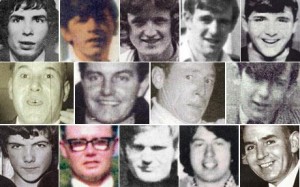Il ministero della Difesa britannico sta preparando i risarcimenti per i parenti delle persone uccise o ferite dai paracadutisti durante la Bloody Sunday

Il primo ministro David Cameron ha già chiesto scusa alle vittime, affermando che aprire il fuoco fu un errore.
Un portavoce del ministero della Difesa ha dichiarato: “Riconosciamo il dolore provato da queste famiglie per quasi 40 anni, e che i membri delle forze armate agirono in maniera sbagliata. Per questo, il Governo è profondamente dispiaciuto.
“Siamo in contatto con i legali delle famiglie e dove ci sarà una responsabilità legale per il risarcimento, lo faremo”.
Ma questa mattina i parenti di una delle vittime della Bloody Sunday hanno fermamente respinto l’offerta di indennizzo.
Le sorelle Linda e Kate Nash, il cui fratello adolescente William fu tra le 14 vittime, hanno dichiarato: “Lo troviamo ripugnante”.
Le sorelle Nash hanno affermato che non prenderanno soldi per lucro personale.
“Mai potremo accettare denaro per la perdita di nostro fratello”, hanno detto. “Troviamo ripugnante accettare qualcosa dal Ministero della Difesa. Se il Ministero della Difesa intende istituire delle borse di studio, possono farlo, ma non in nome di nostro fratello”.
L’anno scorso Lord Saville ha elaborato un importante rapporto nel quale ha criticato l’esercito per gli omicidi di Derry.
L’inchiesta da lui presieduta ha stabilito che l’esercito aveva sparato per primo e senza provocazione.
Nel rapporto si evidenzia come tutte le 14 vittime ed i numerosi feriti erano completamente disarmati ed innocenti.
I paracadutisti hanno inoltre continuato a sparare mentre i manifestanti fuggivano o giacevano feriti a terra. Un padre è stato colpito mentre andava a curare suo figlio ferito, ha rivelato l’imponente rapporto composto da oltre 5.000 pagine.
Durante l’inchiesta seguita al massacro, i soldati insistettero di aver solo reagito, cercando di insabbiare la verita. Il primo ministro britannico David Cameron ha definito il Rapporto Saville “scioccante”.
“Non abbiamo trovato casi in cui è apparso che i soldati erano o avrebbero potuto essere giustificati ad aprire il fuoco”, ha affermato il rapporto.
“Nonostante le prove contrarie fornite dai soldati, abbiamo concluso che nessuno di loro sparato in risposta ad attacchi effettivi o minacciati da qualcuno con bottiglie molotov o nail bomb. Nessuno ha gettato o minacciato di lanciare degli ordigni contro i soldati durante la Bloody Sunday”.
La Bloody Sunday è stata una delle peggiori atrocità del conflitto nordirlandese e ha contribuito a infiammare i 30 anni di violenza portata avanti dall’IRA.
I parenti delle vittime hanno portato avanti una campagna per la giustizia e la revisione delle inchieste iniziali sul massacro, da loro accusata di essere un’insabbiamento della verità.
Tratto da The Telegraph
MoD to compensate Bloody Sunday victim families
The Ministry of Defence is preparing to pay compensation to relatives of those killed or injured by soldiers on Bloody Sunday in Northern Ireland.
Prime Minister David Cameron has already apologised to victims and said the shootings were wrong.
An MoD spokesman said: “We acknowledge the pain felt by these families for nearly 40 years, and that members of the armed forces acted wrongly. For that, the Government is deeply sorry.
“We are in contact with the families’ solicitors and where there is a legal liability to pay compensation we will do so.”
But this morning relatives of one of the Bloody Sunday victims firmly rejected the compensation offer.
Sisters Linda and Kate Nash, whose teenage brother William was among 14 men who died after paratroopers opened fire on civil rights protesters in Londonderry in January 1972, said: “I find it repulsive.”
The Nash sisters said they would not take money for personal financial gain.
“Not under any circumstances will I ever accept money for the loss of my brother,” they said. “I find it repulsive, taking anything from the MoD. If the MoD wants to set up bursaries they can, but not in my brother’s name.”
Lord Saville drew up a landmark report last year which criticised the Army over the killings.
His panel ruled that the Army fired first and without provocation.
It found all 14 who died and the others who were injured almost four decades ago had been unarmed and were completely innocent.
The troops had also continued to shoot as the protesters fled or lay fatally wounded on the ground. One father was shot as he went to tend to his injured son, the mammoth 5,000-page report revealed.
Soldiers later insisted they had only retaliated, in a bid to cover-up the truth, the document – described as “shocking” by Mr Cameron – said.
“We found no instances where it appeared to us that soldiers either were or might have been justified in firing,” it said.
“Despite the contrary evidence given by soldiers, we have concluded that none of them fired in response to attacks or threatened attacks by nail or petrol bombers. No one threw or threatened to throw a nail or petrol bomb at the soldiers on Bloody Sunday.”
Bloody Sunday was one of the worst state acts of the conflict and helped ignite 30 years of violence by the IRA.
Victims have spent years campaigning for justice and the revision of an original probe into the massacre which they branded a whitewash.